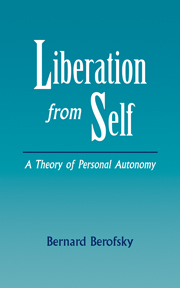Book contents
- Frontmatter
- Contents
- Liberation from self
- 1 Introduction
- 2 Freedom and autonomy
- 3 Freedom of action
- 4 Agent freedom
- 5 Values and the self
- 6 Autonomy and rationality
- 7 Rationality, values, and integrity
- 8 The liberation theory of autonomy: Objectivity
- 9 The liberation theory of autonomy: The place of self
- 10 The value of autonomy
- Notes
- Bibliography
- Index
9 - The liberation theory of autonomy: The place of self
Published online by Cambridge University Press: 16 September 2009
- Frontmatter
- Contents
- Liberation from self
- 1 Introduction
- 2 Freedom and autonomy
- 3 Freedom of action
- 4 Agent freedom
- 5 Values and the self
- 6 Autonomy and rationality
- 7 Rationality, values, and integrity
- 8 The liberation theory of autonomy: Objectivity
- 9 The liberation theory of autonomy: The place of self
- 10 The value of autonomy
- Notes
- Bibliography
- Index
Summary
As we have just seen, the case of the addict or compulsive initiates a quest for an internal difference between the genuine autonomy of the normal person and the heteronomy of the addict. But there are features of an addict's life having nothing to do with the origin of his addiction which can explain his heteronomy. First of all, an unwilling addict lacks proficiency, the capacity to control his environment in accordance with his desires. However he came to this state, the loss of proficiency is grounded in his current condition, independently of origin. He is a cripple even if he freely chose to become one. More likely, the evolution to addiction was not initiated by a free choice. A fully informed, rational adult would not choose to become an addict, especially since one item of information at his disposal is that he would come seriously to regret the decision later. But here again the heteronomy of the original decision has to do with contemporaneous features of the decision, namely, ignorance or irrationality.
But we cannot just ignore the etiological component. People become addicts out of hopelessness, the need to become oblivious to their desperate condition, the desire to be free of physical and emotional pain, and the anticipation of intensely satisfying experiences.
Information
- Type
- Chapter
- Information
- Liberation from SelfA Theory of Personal Autonomy, pp. 210 - 238Publisher: Cambridge University PressPrint publication year: 1995
